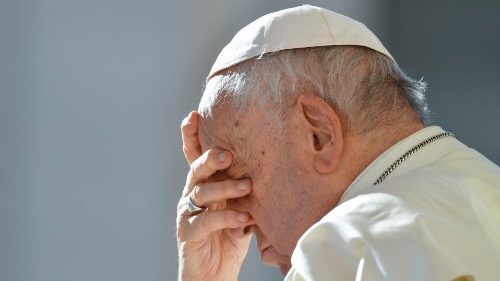
Pope Francis has again taken up pen and paper—as he did on November 19 with his letter to the Apostolic Nuncio to Ukraine—to write a letter to his representative in the Russian Federation, Archbishop Giovanni d’Aniello.
In his letter, the Pope expressed his continued sorrow for the prolonged war in Ukraine that represents a “serious wound inflicted on the human family.

“I trust that the humanitarian efforts directed toward the most vulnerable may pave the way for renewed diplomatic efforts, necessary to halt the progression of the conflict and to achieve the long-awaited peace.”
Close to those who suffer
November 19 marked one thousand days since Russia launched its full-scale invasion of Ukraine. Nearly three years of bombings, killings, injuries, and imprisonments have left hundreds of thousands of people dead and a flood of tears shed by broken families.

Since the start of the war, Pope Francis has sought to operate under the principle of “equi-closeness” toward those who suffer. This principle is proper to the Pope, shepherd of the universal Church, and characterizes Vatican diplomacy.
Cry of pain
Pope Francis said he seeks to act as “interpreter” of the pain “of the tens of thousands of mothers, fathers, and children who mourn their loved ones fallen in war or are anguished over those missing, taken prisoner, or injured, whether they be military or civilian.”
“Their cry rises to God, invoking peace instead of war, dialogue instead of the roar of weapons, solidarity instead of self-interest, because one can never kill in the name of God.”
Rebuilding peace
“The painful and prolonged duration of this war urgently challenges us, calling us to the duty of reflecting together on how to alleviate the sufferings of those affected and to rebuild peace,” the Pope wrote. His letter was signed on December 12 ahead of Christmas but was released on Saturday, December 14.
“We are all bound by a mutual responsibility, in the spirit of true human fraternity,” he added, reiterating his personal concern for the “reports of suffering caused by the conflict in that region.”
The Brothers Karamazov and the suffering of the innocent
There have been many reports of air raids, civilians killed by bombs, increased arms shipments, and a ceasefire that seems increasingly out of reach.
Yet, what anguishes Pope Francis most, he said, is above all the suffering of the innocent.
In his letter, the Pope drew on Russian culture, citing one of the authors most dear to him, Fyodor Dostoevsky, and his The Brothers Karamazov.
He recalled the dialogue, contained in the fourth chapter of Book V, in which Ivan, one of the brothers, explains to Alyosha his rejection of God’s world because of human suffering, particularly that of children. The Pope has cited the scene several times over the course of his pontificate.
“The suffering inflicted on the innocent is a powerful denunciation against every form of violence.”
Renewed diplomatic efforts
Pope Francis said he joins the cry of those who suffer, saying his heart is “grieved by the shattered lives, destruction, and suffering, as well as by the serious wound inflicted on the human family by this war.”
“I trust that the humanitarian efforts directed toward the most vulnerable may pave the way for renewed diplomatic efforts, necessary to halt the progression of the conflict and to achieve the long-awaited peace,” said the Pope.
Imploring the gift of peace
Finally, looking toward “this common path,” Pope Francis recalled the words of “a wise man of God, so dear to the Russian people,” Saint Seraphim of Sarov.
“Acquire the spirit of peace, and thousands around you will be saved.” The Pope’s letter includes the same words in Cyrillic: “Стяжи дух мирен и тысячи вокруг тебя спасутся.”
In conclusion, Pope Francis invited “every person of goodwill to join in prayer to God, imploring the gift of peace, and in the commitment to contribute to this noble goal, for the good of all humanity.”
